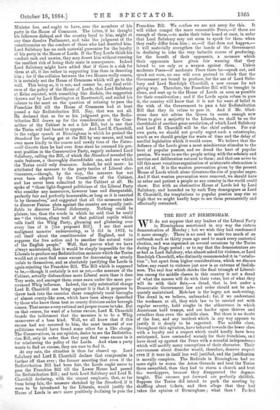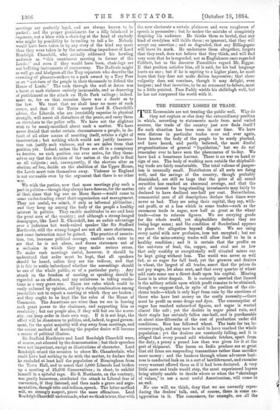THE RIOT AT BIRMINGHAM.
WE do not suppose that any leaders of the Liberal Party in Birmingham sanctioned in any way the riotous demonstration of Monday ; but we wish they had condemned it more strongly. There is no need to make too much of an outbreak such as thirty years ago used to mark every contested election, and was organised on several occasions by the Tories during the Jingo period ; or to say that the demonstrators are as bad as Lord Salisbury, who almost asked for violence, or Lord Randolph Churchill, who distinctly recommended it in "retalia- tion"; but apart from higher considerations, which we discuss below, any resort to violence just now is an extreme of foolish- ness. The real fear which checks the final triumph of Liberal- ism among the middle classes in this country is not a dread of what the masses will do with their votes, but of what they will do with their fists,—a dread, that is, lest under a Democratic Government law and order should not be ade- quately maintained. Mob-law is the bogey, not mob-voting. The dread is, we believe, unfounded; for, if we understand the workmen at all, they wish law to be carried out with regular severity, hold roughs in the abhorrence in which Americans hold tramps, and are harder upon thieves and swindlers than even the middle class. But there is no doubt of the fear, and any incident which in any way appears to justify it is deeply to be regretted. The middle class, throughout this agitation, have behaved towards the lower class with a loyalty and a respect which could hardly have been anticipated, have contended warmly for their franchises, and have stood up against the Peers with a scornful independence which will modify many conceptions of their character. Their nervousness about disorder would, therefore, deserve respect even if it were in itself less well justified, and the justification is morally complete. The Radicals in Birmingham had no more right to storm the Aston Grounds and beat the Tories there assembled, than they had to storm a church and beat the worshippers, because they disapproved the dogmas taught. The excuses put forward are perfectly childish. Suppose the Tories did intend to pack the meeting by shuffling about tickets, and then allege that they had taken the opinion of Birmingham ; what then ? Packed meetings are perfectly legal, and are always known to be packed ; and the proper punishment for a silly falsehood is exposure, not a blow with a chair-leg at the head of anybody who might by possibility be intending to tell a lie. Nobody would have been taken in by any story of the kind any more than they were taken in by the astounding impudence of Lord Randolph Churchill, who actually addressed his howling audience as "this unanimous meeting in favour of the Lords ;" and even if they would have been, chair-legs are not befitting instruments of controversy. The Radicals might as well go and bludgeon all the Tory reporters who describe the crowding of pleasure-seekers to a park owned by a Tory Peer as an "out-turn of the people in their thousands to defend the House of Lords." The rush through the wall at Aston was a burst of mob violence entirely inexcusable, and as deserving of punishment as the attack on Hyde Park railings ; indeed, more so, for on that occasion there was a doubt as to the law. We trust that we shall hear no more of such scenes, and that if the Tories accept Lord R. Churchill's advice, the Liberals, who are irresistibly superior in physical strength, will arrest all disturbers of the peace, and carry them on stretchers to the police cells. We have not the slightest wish to be mealy-mouthed about such a matter. We have never denied that under certain circumstances a people, in de- fault of all other means of asserting itself, retains a right of insurrection ; but nothing which would not justify insurrec- tion can justify mob violence, and we are miles from that ,position yet. Indeed, unless the Peers are all in a conspiracy to deceive, no such position can ever arrive, for they them- selves say that the decision of the nation at the polls is final on all subjects ; and, consequently, if the electors after an election ad hoc, decide on the abolition of the Upper House, the Lords must vote themselves away. Violence in England is not excusable even by the argument that there is no other way.
We wish the parties, now that mass meetings play such a part in politics—though they always have done so, for the matter of that, since that big one on Mons Sacer—would come to some understanding about their organisation and management. They are useful, we admit, if only as informal plebiscites ; and they keep up among the body of the people a healthy interest in politics. They enable multitudes to see and hear the great men of the country ; and although a strong-lunged demagogue, like Lord R. Churchill, has an unfair advantage over a judicious but weak-voiced speaker like Sir Stafford Northcote, still the strong-lunged are not all mere chatterers, and some instruction must be gained. The practice of associa- tion, too, increases political courage, enables each voter to see that he is not alone, and draws statesmen out of a seclusion in which they may make serious errors. To make such meetings useful, however, it should be understood that order must be kept, that all speakers should be heard, unless they are too tedious, and that it is fair to settle beforehand whether the assemblage should be one of the whole public, or of a particular party. Any attack on the freedom of meeting or speaking should be regarded as an offence, and any unfairness in taking resolu- tions as a very grave one. Those are rules which could be easily enforced by opinion, and by a steady combination among journalists not to report a meeting at which they are broken ; and they ought to be kept like the rules of the House of Commons. The Americans are wiser than we are in leaving such great power to the chairman, and supporting him so resolutely ; but our people also, if they will but see the neces- sity, can keep order in their own way. If it is not kept, the effect will be disastrous to politics, and, indeed, to good govern- ment, for the quiet majority will stay away from meetings, and the easiest method of learning the popular desire will become a source of political illusion.
Sir Stafford Northcote and Lord Randolph Churchill were, of course, not silenced by the demonstration • but their speeches were not important, except as illustrations of character. Lord Randolph seized the occasion to abuse Mr. Chamberlain, who could have had nothing to do with the matter, to declare that he excluded at least half the population of Birmingham from the Town Hall, and to assert that 5,000 Liberals had broken up a meeting of 25,000 Conservatives ; in short, to exhibit himself in a spiteful rage. Sir S. Northoote, on the contrary, was gently humorous, attributed the attack to Liberal fear of conversion, if they listened, and then made a grave and argu- mentative, though trite and tedious, speech. The latter method will, we strongly suspect, prove the more efficacious. Lord Randolph Churchill understands, what we think is true, that with the new electorate a certain plainness and even roughness of speech is persuasive ; but he makes the mistake of completely despising his audience. He thinks them so brutal, that any kind of rowdyism will tickle them ; so ignorant, that they will accept any assertion ; and so degraded, that any Billingsgate will leave its mark. He underrates them altogether, forgets that they read, does not believe that they think, and will find very soon that he is regarded, not as Englishmen once regarded Cobbett, but as the decenter Parnellites regard Mr. Biggar. If that position satisfies him, all is said, for his bad language hurts no one ; but if he is aspiring to a higher place, he must learn that fury does not make fiction impressive; that sheer vulgarity does not convince, though it may delight, even bargees ; and that invective, to be an ornament to debate, must be a little pointed. Poor Paddy wields his shillelagh well, but he has not conquered the world with it.



































 Previous page
Previous page